SPECIAL REPORT : Part 422
The Aeroflot affair:
Justice Ministry yesterday interdicted the court official while recommending to Chief Justice Jayantha Jayasuriya that action should be taken against the lawyer concern. The BASL is yet to comment on the issue at hand
By Shamindra Ferdinando
Aeroflot flight SU 289 was preparing to take off from the Bandaranaike International Airport (BIA), on June 02, when a fiscal officer, from the Commercial High Court of the Western Province, walked in around 12.15 pm, soon after the end of day’s proceedings. The official was accompanied by Attorney-at-Law Aruna de Silva, who appeared for the plaintiff, along with Avindra Rodrigo, PC. They were instructed by F.J. & G. de Saram, the leading law firm from the colonial times.
The fiscal officer delivered a copy of the order issued by High Court judge S.M.H.S.P. Sethunge. The recipient of the court order was Acting Head of Air Navigational Services N.C. Abeywardena. The BIA was ordered to detain the aircraft, pending a case filed by Ireland-based Celestial Aviation Trading 10 Ltd., against the Russian state-owned Public Joint Stock Company Aeroflot. According to Justice Minister Wijeyadasa Rajapaksa the fiscal officer and lawyer Aruna de Silva had no right to threaten Mr. Abeywardena, with contempt of Court proceedings, if he allowed the Aeroflot flight to take off as there was no court order against him.
Justice Minister Rajapakse, being a veteran lawyer and a former President of the Bar Association of Sri Lanka, did not entirely spare the High Court Judge responsible for the exparte order. He said judges should be more mindful when issuing such exparte orders.
At the time the court officer delivered the warning, 191 passengers and 13 crew of the Airbus A 330-300 were on board. They were asked to get off the plane. The Aeroflot drama transpired in the Commercial High Court of the Western Province on June 03. The airline’s regional manager, for India and Sri Lanka, Sergey Evgenievich, was present in court.
On the following day, Russia summoned Sri Lanka’s Ambassador in Moscow, Prof. Janitha Abeywickrena Liyanage, to the Foreign Ministry, where Sri Lanka’s action was condemned. Russia demanded Sri Lanka to resolve the issue at hand, soon, to avoid having a negative impact on the traditionally friendly bilateral relations. What Moscow said was that there would be serious repercussions.
Viyathmaga activist Liyanage received appointment as Sri Lanka’s Ambassador in Moscow last October. Married to Prof. Sudantha Liyanage, she served as Vice Chancellor of the Gampaha Wickramarachchi University of Indigenous Medicine, prior to her taking up Sri Lanka’s top diplomatic post in Russia.
There hadn’t been a previous instance of a Sri Lankan Ambassador in Moscow being summoned to their Foreign Ministry. The Aeroflot affair has caused irreparable damage to Sri Lanka-Russia ties at a time Colombo needs retain its perennial friends among the international community.
Perhaps the crux of the issue, at hand, is there hadn’t been an enjoining order issued in respect of the second defendant Acting Head of Air Navigational Services N.C. Abeywardena. After having heard submissions by both parties, the court reiterated, on June 03, that there hadn’t been an enjoining order issued in respect of the second defendant. The public Joint Stock Company Aeroflot is the first defendant.
The court was told how Aeroflot flight was detained in spite of an assurance given by Sri Lanka to Russia that Aeroflot could operate to and from Colombo without an issue. The Counsel for the first defendant raised the issue while highlighting the embarrassment caused to Russia.
On behalf of the government, the Foreign Ministry issued the following statement on June 04: The Ministry of Foreign Affairs wishes to state the following with reference to the Aeroflot passenger aircraft flight SU-289 which is currently at the Bandaranaike International Airport (BIA).
On 2 June 2022, the Commercial High Court of the Western Province issued an Enjoining Order on the Aeroflot flight restraining it from taking off from Bandaranaike International Airport. The case relates to a commercial dispute between the Plaintiff, Celestial Aviation Trading 10 Limited, an Irish Company, against the first Defendant the Public Joint Stock Company Aeroflot and the second Defendant, Mr. N. C Abeywardene/Acting Head of Air Navigation/Airport and Aviation Services of Sri Lanka (AASL), Katunayake.
The matter is still pending final determination of the Court. This matter is also under consultation through normal diplomatic channels.”
Obviously, the Foreign Ministry hasn’t perused the Court proceedings or at least inquired from relevant parties before issuing the media statement. Had the Foreign Ministry done so, the shocking manipulation of the Court proceedings to pressure the Acting Head of Air Navigation would have come to their notice. The question is whether some of our officials are just playing dumb having been part of a foreign conspiracy to embarrass Russia and to exacerbate the dire situation in the country, already beset with a myriad of problems.
The Chief Justice, the Justice Ministry and the Bar Association of Sri Lanka (BASL) should also inquire into the highly contentious issue.
Angry reactions
Close on the heels of Russia’s angry reaction, SLPP lawmaker Rear Admiral Sarath Weerasekera took up the issue at hand with President Gotabaya Rajapaksa. In a two-page letter, the former Public Security Minister pointed out that the fiscal officer’s action against the backdrop of High Court judge Sethunge’s declaration that he didn’t issue an enjoining order in respect of the government or the Airport and Aviation Services Ltd.
The Colombo District MP questioned the detention of the Aeroflot flight in spite of Sri Lanka’s written assurance to Russia that Aeroflot was free to operate to and from the BIA without hindrance. The former Navy Chief of Staff warned that Sri Lanka shouldn’t be surprised if Russia felt that the government guaranteed Aeroflot freedom to operate to and from the BIA to lure them.
Lawmaker Weerasekera challenged Prime Minister Ranil Wickremsinghe’s assertion that the issue was a matter between two private parties. How could that be when all know Aeroflot operated flights to the BIA on written assurance given by the government?
Rear Admiral Weerasekera reminded the President of the support provided by Russia during the war against the LTTE and the constant backing Sri Lanka received at the Geneva-based United Nations Human Rights Council (UNHRC). The war veteran said that even after the war, China and Russia always stood by Sri Lanka as Western powers pursued Sri Lanka on the human rights front as they were smarting over the defeating of the LTTE. The MP declared that unless remedial measures were taken the country would have to face the consequences.
Lawmaker Weerasekera told the writer that there should be a wider investigation to ascertain whether utterly disruptive and manipulative action taken against Aeroflot was meant to cause a rift between Sri Lanka and Russia in line with the overall destabilization plan here mounted by the West. Weerasekera pointed out how disruption of Aeroflot flights could deprive Sri Lanka of much needed foreign currency and Russia being a key market for our tea that, too, would be in jeopardy. Sri Lanka’s economy couldn’t take any more shocks, MP Weerasekera said, emphasizing the responsibility on the part of President Gotabaya Rajapaksa to reverse the destabilization project.
Amidst heavy pressure, Sri Lanka, on Monday (06) lifted the alleged restriction imposed on the Aeroflot flight. But, the matter should not end there. The government should investigate the Aeroflot affair. Many believe it was certainly not isolated but part of a well-orchestrated campaign.
Sri Lankan Airlines suspended flights to Moscow, on March 26 citing ‘operational restrictions that are outside of the airline’s control.’
“The restrictions are in the form of international financial and aircraft insurance limits which have been imposed on Russia due to the ongoing Russia-Ukraine war, and directly impact SriLankan Airlines’ flight operations to Russia,” the airline said in a statement.
The airline maintained two weekly flights between Colombo and Moscow before the cessation of operations.
In spite of continuing sanctions, Aeroflot, on April 08, resumed regular flights to Colombo. Until the June 02 incident, flights arrived here three times a week, on Wednesday, Friday and Saturday, while the flights back to Moscow were operated on Thursday, Saturday and Sunday. Aeroflot suspended all flights on April 08 following US and EU sanctions.
Wimal issues warning
Federation of National Organisation, comprising the Patriotic National Movement (Dr. Wasantha Bandara), Patriotic National Front (Attorney-at-Law Nuwan Bellanthudawa), People’s Responsibility Centre (Wasantha Alwis) and People’s Voice for Justice and Sovereignty (Attorney-at-Law Madhaumali Alwis), in a joint letter, dated June 04, has sought President Gotabaya Rajapaksa’s intervention.
The grouping has explained how various interested parties exploited the country and pursued strategies, detrimental to the Sri Lankan State. Dr. Wasantha Bandara told the writer the government seemed to have lost its bearings and was quite incapable of looking after Sri Lanka’s interests. Dr. Bandara said that the Aeroflot issue should be examined against the backdrop of Sri Lanka having entered into a controversial agreement with US-based New Fortress Energy last September. “Don’t forget the government finalized that deal at midnight. Our legal challenge failed to convince the Supreme Court.”
National Freedom Front (NFF) leader Wimal Weerawansa, who challenged the US energy deal in Court along with Vasudeva Nanayakkara and Udaya Gammanpila in spite them being members of the Cabinet at that time on Sunday (05) questioned the culpability of the executive, the legislature and the judiciary over the Aeroflot affair. The outspoken politician didn’t mince his words when he asserted the executive, then legislature and the judiciary were working together to transform the economic and political crisis to a human tragedy. MP Weerawansa declared that the government has allowed the situation to develop and those in authority were yet to take tangible measures to stabilize the economy.
At the onset of the briefing, MP Weerawansa said that the government was busy jeopardizing Sri Lanka’s relations with Russia after having antagonized China, two of Sri Lanka’s closest friends. The Aeroflot dispute is perhaps the worst during 65 years of diplomatic relations.
President of Sri Lankan Business and Professionals Society in Russian Federation, Jagath Chandrawansa, in a letter to President Gotabaya Rajapaksa, alleged that a deliberate attempt was being made to cause a rift with Russia. Chandrawansa alleged that the operation was meant to cause economic deterioration.
Chandrawansa, too, drew the President’s attention to the fiscal officers’ super-fast action and the government’s pathetic failure to thwart the clandestine project. Chandrawansa told the writer that Sri Lanka should be ashamed of the way the Aeroflot flight was handled after having requested the Russian national carrier to fly here.
Lawmaker Vasudeva Nanayakkara didn’t hesitate to speculate the possibility of the US being behind the Aeroflot affair. Declaring the incident at the BIA a conspiracy, the veteran politician alleged that the US wanted to deprive Sri Lanka an opportunity to procure crude oil from Russia at a much lower cost.
MEP Leader and Chief Government Whip Dinesh Gunawardena, too, declared that the Aeroflot issue should be addressed quickly. The Minister warned that remedial measures should be taken before the incident caused serious damage to bilateral relations and to the country’s economy through loss of vital tourist arrivals from Russia.
Former General Secretary of the Communist Party Dew Gunasekera has demanded an explanation from Premier Wickremesinghe over his alleged bid to downplay the incident. Gunasekera asserted that Sri Lanka was experiencing an extraordinary threat. The incident involving the Aeroflot flight underscored our vulnerability.
Russian backing for war effort
Russia and Ukraine were among the few countries that readily threw their weight behind Sri Lanka’s war effort. Sri Lanka acquired Soviet era Mi24 helicopter gunships from Ukraine and Mi-35 Hind copters from Russia. Mi-24 arrived in Sri Lanka in the first week of Nov 1995. Russian military personnel flew three gunships acquired on a wet lease from Colombo to Hingurakgoda air base. The Russians carried out actual combat operations beginning Nov 17, 1995. The Russians carried out missions along with the Air Force till February 1996. However, the Russians provided the required flying training till 2000. The Hingurakgoda headquartered famed No 09 squadron played a critical role in the overall war against the LTTE.
Sri Lanka sought superior helicopter capable of providing close air support against the backdrop of losing two Avros in April 1995 and one Pucara ground attack aircraft in July 1995. The LTTE changed the military environment with the introduction of heat-seeking missiles. Sri Lanka responded by deploying Mi-24s and subsequently Mi-35 capable of operating against missile attacks. As ground troops required close air support, the then government delayed ‘Operation Riviresa’ until the arrival of helicopter gunships. The deployment of Soviet gunships paved the way for the successful conclusion of ‘Operation Riviresa’ that brought the Jaffna peninsula under control by early 1996.
The celebrated No 09 attack helicopter squadron flew 222 combat missions during ‘Operation Jayasikurui’ conducted through May 1997 to Dec 1998. In addition to the three Mi 24 deployed in Nov 1995 and sent back to Ukraine for overhaul three years later, Sri Lanka during 1996-2001 period inducted 23 Mi 35 Hinds.
The No 09 attack squadron played a pivotal role during the successful Eelam War IV (Aug 2006 to May 2009). The LTTE never managed to neutralize the formidable No 09 attack squadron that quite clearly damaged their fighting capability.
In response to The Island queries, former Foreign Minister Rohitha Bogollagama said that he was quite perplexed at the way the government handled the issue, particularly the absence of an immediate initiative by the Ministry of Foreign Affairs to redress the colossal damage that has been caused to the bilateral relationship that existed at its best terms between the two friendly countries.
Bogollagama issued the following statement: “Russia has remained a steadfast friend of Sri Lanka during the post-independence era and shadowing us against many a hurdles we confronted during the time of countering terrorism in Sri Lanka.
In the post period of defeating terrorism, Russia helped us to navigate through the International pressure and the accusations that were directed at us, by certain influential members of the UN body. Our regular visits and the reciprocity that was extended by Russia at the Heads of State and the Foreign Ministers level on a throughout basis was a clear manifestation of the closeness between our two countries.
Having said that the Aeroflot services had resumed to Sri Lanka at the behest of Sri Lankan Authorities giving an explicit assurance that their Aircraft shall not be detained or seized in Sri Lanka. On this undertaking, Aeroflot has commenced their services bringing us the much needed tourists and the foreign exchange.
The very enjoining order been vacated on the 6th of June itself clearly demonstrates the very point that if the Court intervention was sought immediately and efficaciously on 3rd of June itself, the protracted delay and the embarrassment caused could have been well mitigated. It would have definitely given a message with clarity that we stand well by Moscow, though there are procedures one may entail like that of the Judicial Process.
Furthermore, we have not witnessed a direct engagement at the highest echelon of power as a mitigatory step for the blow that shattered our friendship
I am rather disappointed that the authorities have failed to look at the overall impact of the repercussions associated in the Aeroflot now withdrawing their services to Sri Lanka over this incident, thus denying our country the much needed tourists arrivals and a global connectivity that Russia was maintaining.
It must be noted that Russia, China, India and Japan commands both Universal influence and connectivity, being four giants in Asia.
As an Asian Country, when the West is turning against Russia we could have easily enhanced our traditional relationship, which opportunity was completely lost, due to the mishandling of a trivial private litigation.
I stand to disagree with Prime Minister Ranil Wickremesinghe stating that the Aeroflot case is not an issue between the two Countries, but a private legal issue. But unfortunately the fact that it is a state Aircraft of the Russian Government visiting Sri Lanka, at the explicit undertaking given by the Governmental Authorities in Sri Lanka has not been addressed and taken into account by the Hon Prime Minister in making this statement.
It is time, Sri Lanka assured our highest consideration and regret over this particular incident, by the Prime Minister to the Foreign Minister of Russia Sergey Lavrov, as a prudent means to restore the devastated bi-lateral Relations.
Thereby it is time to mature as a Country, to put “Sri Lanka First” and advance to become part of the Global Diplomacy as practiced by many countries, though small in size but mighty, in terms of one’s philosophy.”

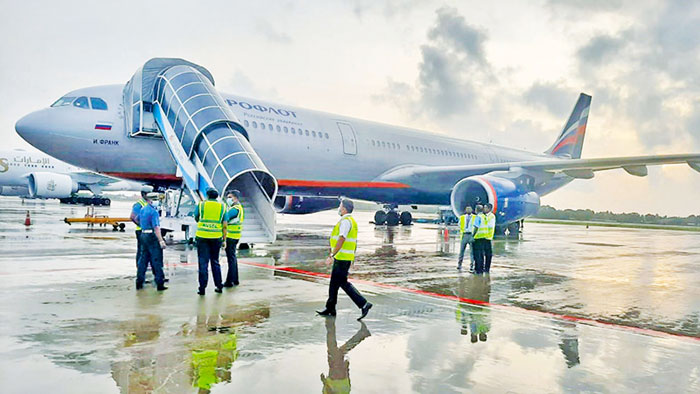
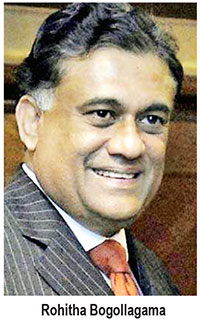 Justice Minister Rajapakse, being a veteran lawyer and a former President of the Bar Association of Sri Lanka, did not entirely spare the High Court Judge responsible for the exparte order. He said judges should be more mindful when issuing such exparte orders.
Justice Minister Rajapakse, being a veteran lawyer and a former President of the Bar Association of Sri Lanka, did not entirely spare the High Court Judge responsible for the exparte order. He said judges should be more mindful when issuing such exparte orders.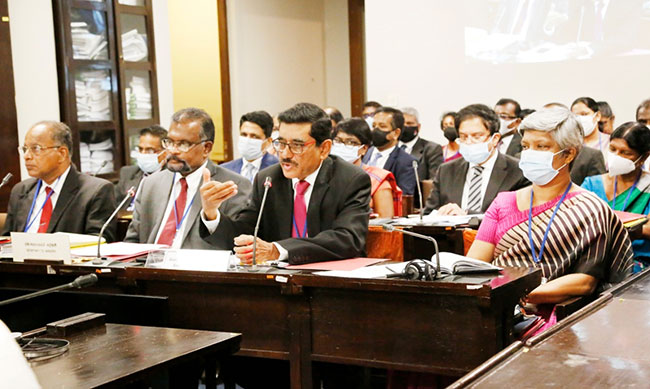
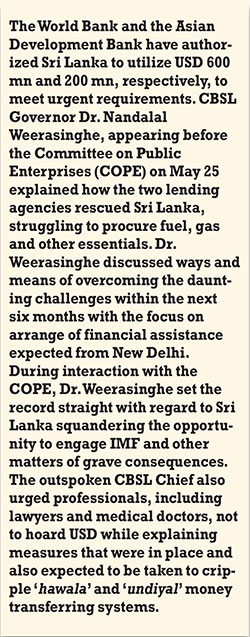 But, the releasing of video footage of the entire meeting by the Parliament helped the public to clearly understand how the Finance Ministry, the Central Bank of Sri Lanka (CBSL), the Monetary Board, the then Presidential Secretary Dr. P.B. Jayasundera, the Cabinet of Ministers and the Parliament contributed to the debilitating economic-political and social crisis. The COPE meeting should attract Attorney General Sanjay Rajaratnam’s immediate attention. The Bar Association of Sri Lanka (BASL), too, cannot turn a blind eye to the shocking exposure of a seriously flawed public finance system and nothing but a negligent and incompetent Parliament.
But, the releasing of video footage of the entire meeting by the Parliament helped the public to clearly understand how the Finance Ministry, the Central Bank of Sri Lanka (CBSL), the Monetary Board, the then Presidential Secretary Dr. P.B. Jayasundera, the Cabinet of Ministers and the Parliament contributed to the debilitating economic-political and social crisis. The COPE meeting should attract Attorney General Sanjay Rajaratnam’s immediate attention. The Bar Association of Sri Lanka (BASL), too, cannot turn a blind eye to the shocking exposure of a seriously flawed public finance system and nothing but a negligent and incompetent Parliament.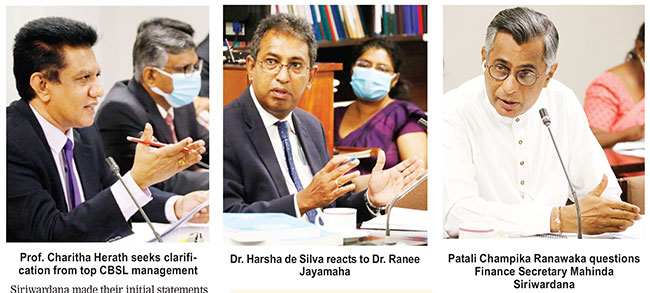 The Monetary Board consists of five persons – two ex-officio members, Governor, Secretary to the Finance Ministry, and three nominated members. At the time of the issue at hand Prof. W.D. Lakshman and S.R. Attygalle had served on the Monetary Board and the latter as the Secretary to the Finance Ministry as well. The Monetary Board’s appointed members were President’s Counsel Sanjiva Jayawardena, Dr. Ranee Jayamaha (retired Central Bank Deputy Governor) and successful businessman Samantha Kumarasinghe, who put Sri Lanka on the world cosmetic manufacturing map through his Nature’s Secret line of products, which earned the ire of some multinational leaders in the field because of its resounding overnight success.
The Monetary Board consists of five persons – two ex-officio members, Governor, Secretary to the Finance Ministry, and three nominated members. At the time of the issue at hand Prof. W.D. Lakshman and S.R. Attygalle had served on the Monetary Board and the latter as the Secretary to the Finance Ministry as well. The Monetary Board’s appointed members were President’s Counsel Sanjiva Jayawardena, Dr. Ranee Jayamaha (retired Central Bank Deputy Governor) and successful businessman Samantha Kumarasinghe, who put Sri Lanka on the world cosmetic manufacturing map through his Nature’s Secret line of products, which earned the ire of some multinational leaders in the field because of its resounding overnight success.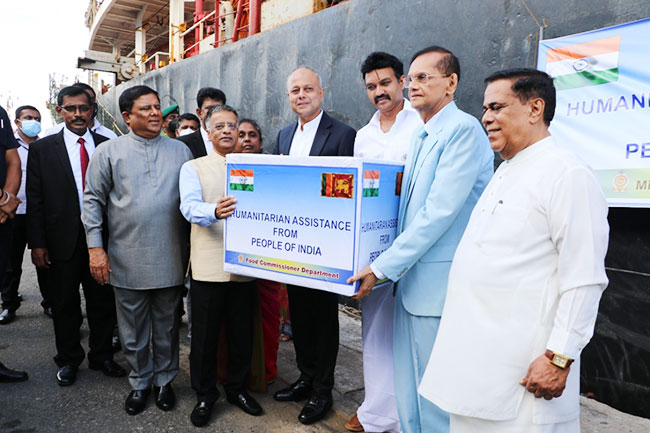
 Having repeatedly accused President Gotabaya Rajapaksa of direct complicity in the 2019 Easter Sunday massacre, both received ministerial portfolios from the President. Wickremsinghe is in the process of consolidating his position.
Having repeatedly accused President Gotabaya Rajapaksa of direct complicity in the 2019 Easter Sunday massacre, both received ministerial portfolios from the President. Wickremsinghe is in the process of consolidating his position. Speaker Chamal Rajapaksa ensured the implementation of the then UPFA government’s strategy. Having served as a minister till April this year and played a critical role in the manipulation of Parliament, it wouldn’t be fair to find fault with Mahinda Rajapaksa solely for being power hungry.
Speaker Chamal Rajapaksa ensured the implementation of the then UPFA government’s strategy. Having served as a minister till April this year and played a critical role in the manipulation of Parliament, it wouldn’t be fair to find fault with Mahinda Rajapaksa solely for being power hungry.